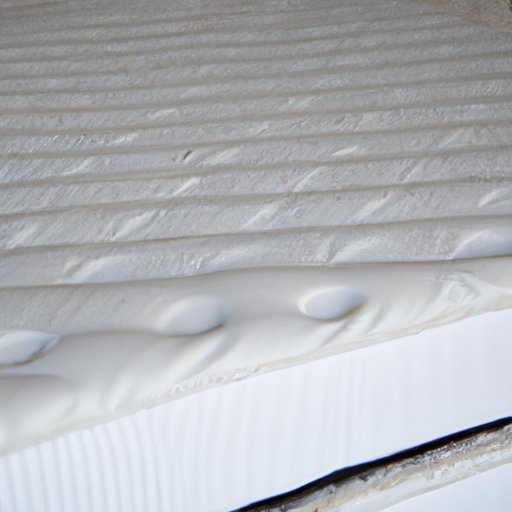
I. Introduction
When it comes to a good night’s sleep, a quality mattress is key. An uncomfortable or worn-out mattress can interrupt sleep and even cause back or neck pain. Considering the amount of time we spend sleeping, it’s important to invest in a mattress that provides the proper support and comfort for your body. However, mattresses are expensive, and it’s understandable to want to maximize their lifespan. In this article, we’ll explore how long you can expect your mattress to last, what factors impact longevity, how to maintain your mattress, and signs that it’s time to replace it.
II. Addressing the Average Lifespan of a Mattress
On average, a well-made mattress can last between 7-10 years with proper care and maintenance. However, this estimate can vary depending on several factors. Factors such as usage, frequency of use, weight, and the quality of materials used in the mattress construction can impact the lifespan. Mattresses used every night will experience more wear and tear than those used sporadically, and if it is a lower quality mattress, it is likely to wear faster than a higher quality one.
III. The Effect of Quality on Longevity
One of the most significant factors that affect the durability of a mattress is quality. Mattresses made with high-quality materials and construction methods are likely to last longer than cheaper options. Look for mattresses with high-density foam, pocketed coil springs or other supportive internal structures, and durable fabric covers. It’s worth the investment to purchase a high-quality mattress, you’ll enjoy better comfort and will save money in the long run by not having to shop for a new one as often.
IV. Mattress Maintenance
Maintaining your mattress is key to extending its lifespan. Proper maintenance involves flipping and rotating the mattress every three months, following the manufacturer’s care instructions, and using a mattress protector to prevent damage from spills and stains. Flipping the mattress enables it to evenly distribute the weight placed upon it, which prevents sagging and uneven wear. A mattress protector serves as an extra barrier between your mattress and external elements that can damage it and speeds up the wear and tear.
V. Sleeping Habits’ Impact on Mattress Longevity
Our sleeping habits can affect the lifespan of a mattress, particularly our weight, sleeping positions, and frequency of use. Those who are overweight, for example, may experience wear and tear on a mattress more quickly than those who are not. Similarly, those who sleep on their back or stomach may find that their mattress wears unevenly compared to those who are side sleepers. Look for a mattress that suits your preferred sleeping position and provides adequate support for your body type.
VI. Mattress Replacement Signs
Eventually, even the highest quality mattresses will start to show signs of wear and tear. Some common signals that it’s time to replace your mattress includes sagging, indentations where you sleep, and rips or stains in the fabric. Continuous back pain, disrupted sleep, and allergy flare-ups can also be indications that a mattress is past its lifespan.
VII. Environmental Impacts
Your mattress can also be impacted by environmental factors. Exposure to sunlight or excessive humidity can damage the fabric of a mattress, and exposure to pests like bed bugs can cause significant damage. To reduce the impact of these factors, protect the mattress with a cover or encasement, position it away from windows or direct sunlight, and vacuum it regularly to prevent bed bug infestations.
VIII. Conclusion
A mattress is a long-term investment that can have a significant impact on the quality of sleep and overall health. When considering purchasing a mattress, it’s crucial to think long-term and assess factors like mattress quality, maintenance, and sleeping habits. By flipping and rotating your mattress, using a mattress protector, and replacing it when you start to see signs of wear and tear, you can extend its lifespan and get the best value for your money, leading to a better night’s rest overall.




